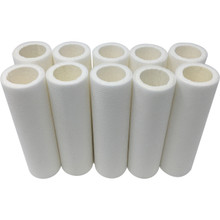
Our microfibre filter elements allow a high filtration efficiency with a low pressure drop. Depending on the application, we can offer our particle or our coalescence microfibre filter elements.
Special bonding, adapted to the application, gives the filter elements high strength. This is important because no fibre should come out of the element itself. Depending on the application, we can use different binders. Coalescence Microfiber filter Elements are able to filter out up to 99.99 % of all particles and aerosols down to a size of 0.1 µm from the air flow. With the coalescence microfibre filter elements, the aerosols are filtered out of the volume flow via a 2-layer system. The first layer consists of fine microfibres to which the tiny aerosols attach themselves. As soon as they have accumulated into larger droplets, they are guided downwards by gravity via the second layer. The filtered liquid can be returned to the circuit without any loss of quality or additives.
Disposable Filter Elements
Disposable bonded microfibre filter elements are manufactured from
precise mixtures of borosilicate glass microfibres to the very highest
standards of quality control. These elements offer exceptional filtration
efficiency at very low pressure drops and being +90% void volume they
give a very long service life.
The elements are bonded to impart high strength and eliminate fibre
shedding and the choice between the different binders available will depend
on each application. Disposable elements are self-sealing and sealed into a
filter housing by axial compression.
Coalescing or Particulate Applications
There are two types of filter element available, particulate and coalescing.
The particulate filter elements use a single layer of filter media whereas
coalescing elements have a fine capture layer and a coarse drainage layer.
The coarsest grade that will adequately protect the application should
be chosen as this will result in the most economical solution to the
contamination problem by extending the service life. Disposable bonded
microfibre filter elements are suitable for both gas and liquid applications.
Aerolith S Filter Elements
Aerolith S Filter Elements are a further development of the well-known Pall® product Aerolith with improved properties. Composed of selected high quality ceramic raw materials, the alumosiliceous filter material Aerolith S is produced in a controlled production process as a cylinder, candle or tile. The special merits of Aerolith S filter elements are the higher mechanical stability as well as an improved pH resistance in the alkaline range. Due to the porous labyrinth structure with high particle storage capacity, Aerolith S filter elements are well suited for depth filtration applications up to temperatures of 700°C.
Applications
Cylinders
Particle filtration of Liquids: Acids, water and alcohol.
Particle filtration of Gases: Process gases, mixed gas, air, sewer gas, natural gas, and liquid gas.
Coalescer: Compressed air, nitrogen and carbon dioxide.
Storing Media: Water, colour and ink.
Vacuum Lance: Retention of fire extinguishing powder.
Plates
Nutsches: Mud thickening.
General Information
Porous Aerolith S ceramic is approved for the utilization in drinking water according to German regulations DVGW W270 and the KTW recommendation.
Aerolith S filter elements can be machined using hard metal tools.
Ceramic elements are to be handled with care.
Elements can be easily glued using commercial glues which Pall can supply. Consideration must be paid to operating temperature and chemical resistance.
Pall can supply a variety of element fixing systems.
Chemical Resistance³
Aerolith S filter elements are resistant against most acids, saline solutions and organic solvents, liquid or gaseous. It does not resist hydrofluoric acid. Aerolith S filter elements are resistant up to pH 10 in the alkaline range.
³ As end use conditions can vary, it is the users responsibility to verify compatibility with their specific use conditions.
¹ PSG Retention efficiency test 99.98%
² Depending on operating conditions
【 Go Back 】 | 【 Close this window 】



